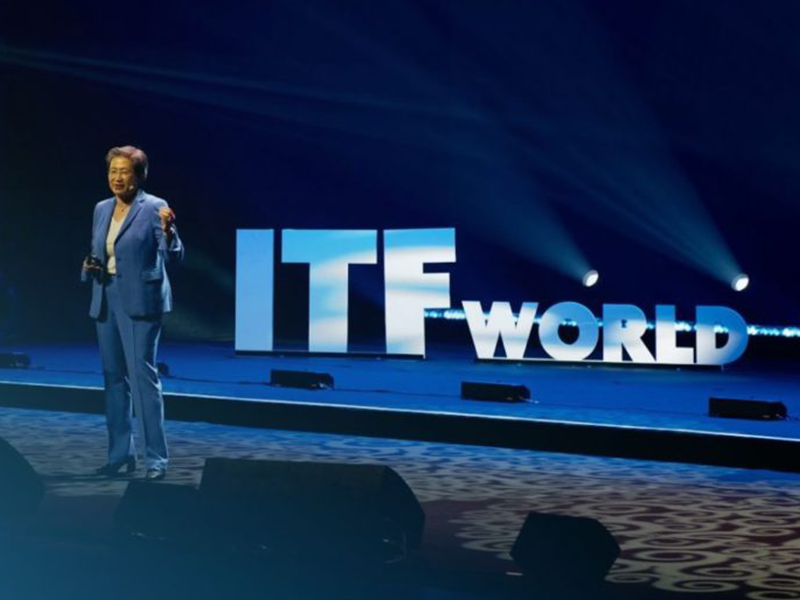
European Semiconductor Conference, Su Zifeng, Mi Yujie and Liu Yangwei talk about AI industry trends

TechNews
May 22, 2024
Author: Central News Agency
May 22, 2024
Author: Central News Agency
The Belgian Microelectronics Research Center (imec), the "Light of Semiconductors" in Europe, held its annual science and technology forum, inviting Super Micro CEO Lisa Su, TSMC Chief Operating Officer Mi Yujie and Hon Hai Chairman Liu Yangwei to speak on AI and other industry trends, highlighting the role of Taiwanese people in the industry. Importance of the semiconductor industry.
This year marks the 40th anniversary of the founding of imec. The Imec Technology Forum (ITF World) will be held in Antwerp today and tomorrow, and the annual innovation award will be awarded to Taiwanese-American AMD CEO Lisa Su.
In her speech, Su Zifeng used the performance of AMD products to demonstrate the amazing technological evolution of semiconductors over the past 40 years. From the AMD286 processor in 1984, which contained 134,000 transistors, to the company's most advanced server processor today, which contains 90 billion transistors. crystals, and its latest artificial intelligence (AI) processor MI300 contains 153 billion transistors.
But what she wants to emphasize is not only the advancement in computer computing performance, but also the energy consumption issues behind it.
Because driving AI chip operations requires millions of watt-hours of electricity, the power consumption in the AI era will draw a sharp upward curve. Su Zifeng believes that technology people have the responsibility to develop through various innovations, including chip computing processing, chip Encapsulation or algorithm, the entire AI technology students
The system should jointly flatten the power consumption growth curve.
AMD set a goal in 2020 to increase energy efficiency by 30 times by 2025. Su Zifeng said that judging from the current research and development situation, the energy efficiency goal should be increased to 100 times in 2026 and 2027. She invited people in the scientific and technological circles present to work together to make the entire industry systematically improve energy efficiency.
Sitting in the first row of TSMC's succession echelon, Mi Yujie, who is 190 centimeters tall, stood on the stage of this annual event in the European technology industry, which was particularly eye-catching. Although foreign media actively invited sideline interviews, TSMC made it clear before the meeting that it would not accept any media interviews.
Mi Yujie's speech also focused on the evolution of semiconductor technology and the explosive growth trend towards AI machine learning. In addition, facing the automotive industry, which plays an important role in Europe, he particularly analyzed the development of key self-driving technologies such as sensors, including magnetoresistance. High performance of automotive chips such as MRAM.
He said that semiconductors are the starters that drive the global economy. It is expected that global semiconductor revenue will reach US$1 trillion (approximately NT$32.3 trillion) by 2030, of which high-performance computing will account for 40%, mobile communications will account for 30%, and motor vehicles will account for 30%. Accounting for 15%, the Internet of Things accounts for 10%.
Driven by semiconductors, the global electronics industry revenue will reach US$3 trillion in 2030, and the wider information industry revenue will reach US$12 trillion, becoming the basis for global economic output to reach US$145 trillion by then.
Mi Yujie emphasized that, including TSMC’s wafer foundry model, semiconductor achievements come from industry cooperation, and this will continue to be the case in the future.
Hon Hai Chairman Liu Yangwei’s speech focused not only on introducing the academic achievements of Hon Hai Research Institute in fields ranging from semiconductors to quantum computers, but also on promoting Hon Hai’s innovative electric vehicle business model CDMS (Contract design and manufacturing service). We want to change the "one-stop" dominant model of traditional car manufacturers from design, production to marketing and service.
He believes that as the electric vehicle industry faces huge price pressure, there will be great opportunities to adopt a similar professional electronics foundry (EMS) model. "What happened in the outsourcing of the information and communications industry will also happen in the outsourcing of the electric vehicle industry."
【Disclaimer】
The content of this article only represents the author's personal views and has nothing to do with Creating.
The content, textual description and originality have not been confirmed by this website. This website does not make any guarantee or commitment for this article and all or part of its content, authenticity, completeness and timeliness. It is for readers' reference only. Please verify the relevant content by yourself.
Creating Nano Technologies, Inc.
59 Alley 21 Lane 279, Chung Cheng Road, Yung Kang City, Tainan, TAIWAN
TEL:886-6-2323927 FAX:886-6-2013306 URL: http://www.creating-nanotech.com
